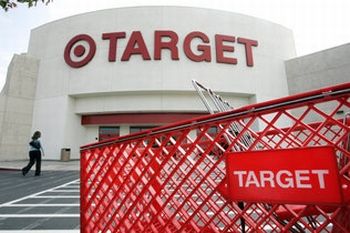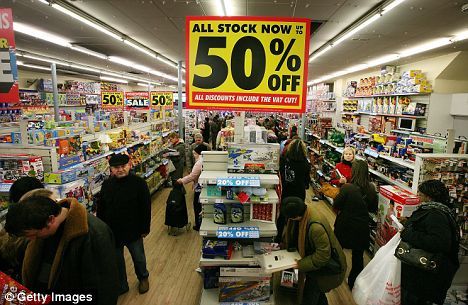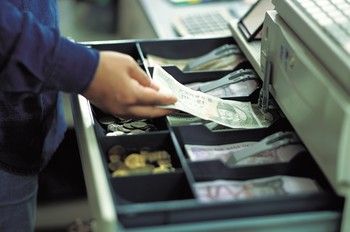
Publisher:
Bonnie King
CONTACT:
Newsroom@Salem-news.com
Advertising:
Adsales@Salem-news.com

~Truth~
~Justice~
~Peace~
TJP
Jan-09-2011 23:23

 TweetFollow @OregonNews
TweetFollow @OregonNews
Retailing Tricks of the Trade
J. D. Adams Salem-News.comThose of you who think your financial situation puts you above all this are the ones foolishly throwing away the most money.
 The Charlotte Observer article, Target coupon users shortchanged, explains how Target stores were caught in October for shortchanging customers using certain coupons. The problem is not unique to this retailer. |
(SALEM, Ore.) - Every day in America, thousands of dollars of illicit profit are padding the coffers of retail corporations, as grocery, drug, and variety stores engage in practices that exploit the trust of busy shoppers. In the lingering aftermath of the Great Recession, a variety of tactics are used to exploit customers trying to save money, including false advertising and the programming of cash registers that usually result in higher prices paid for goods.
These facts alone reveal the ethics issues involved in the problem, for very rarely does an error occur that results in a cheaper price paid for an item. What we are talking about are calculated discrepancies on a large scale, resulting in a predictable increase in profit. Even when the store is alerted of a mistake, frequently no correction is made while the item is still in stock and a sale still in progress. Only those customers who complain are refunded any money.
Those of you who think your financial situation puts you above all this are the ones foolishly throwing away the most money. It is the not-too-smart shoppers that make these tactics profitable for grocery and retail establishments.
With the help of my wife I have compiled a list of retailing dubious deeds. A common tactic used to increase profits is to advertise a particular item on sale to draw customers in to the store, but with the wrong type or size shown in the ad. At the register, the price appears to be correct, but the size of the product makes the savings insignificant or even higher in price than normal. There are many variations of this tactic, including advertisements with generic or ambiguous pictures of a product, or pertinent product information in fine print that is placed so as not to be noticed.
 Problems are not unique in the US: 'Misleading: Shoppers in Woolworths in |
Another trick that is subtle but profitable is to advertise an item on sale, while marking up other staple items that are likely to be purchased. In this case, the price of goods don't reflect standard market values based on availability and demand, instead prices reflect a sinister manipulation of consumers.
Another ploy is to surreptitiously limit the quantity of a particular item that can be purchased. It may or may not be on sale. If advertised, the purchase limit is not mentioned. If signs marking an item are present in the store aisle, the purchase limit isn't displayed, or is displayed some distance away from the product. At the cash register, the items beyond the limit have a higher than normal price, so the store quickly recoups the money the customer thought they were saving.
A frequently used advertising scheme is to sell a number of an item for a good price, but the price can only be had for multiples of that number. Purchasing anything less results in a higher price per item. Only by checking the receipt will the shopper find they've been had. The advertisement may not state the stipulation of this deal, or it will be in small, unreadable print. Offering a good price with a rebate draws in many customers. But most people will never get around to turning in the rebate. The paperwork to be filled out is prohibitively complex, so the store is effectively able to sell at a higher price and maintain the illusion of a bargain.
 |
The oldest trick is simply to program the register with the wrong price. This is often masked behind a charade of ignorance or good-natured incompetence. It may be excusable the first time it is done, but there is no excuse for overcharging customers after days or weeks. Most customers will not notice or may be too busy to complain, but the profits are cumulative and significant to the company.
In other cases, marketing pundits have fiendishly relied on packaging sizes that have been standard since your childhood to create the illusion of competitive pricing. Have you noticed that a 10 lb. bag of anything is now 8 lbs.? A pound of bacon is now 12 oz., and the formerly 39 oz. coffee is now 33 oz. When confronted by customer complaints about this practice, management has actually claimed they are helping the public lose weight. Have you bought a pair of Levi's 501s lately? Compared to the once iconic brand of my youth, the jeans are now made with lighter weight denim, with an absolute minimum of belt loops. And the fuel you pay dearly for at the pump is not your father's gasoline. With the addition of ethanol, the potential horsepower and mileage are reduced.
In some cases, the store manager will be called upon to harass customers who complain on a frequent basis of valid discrepancies. It is upon these store personnel that the bulk of the customer's wrath should be vented. My belief is that an unusual punishment should be reserved for those who program the erroneous prices into the cash register, a special afterlife in which the worth of their soul is printed on a receipt. Of course, the total would be irrefutable, and grossly undervalued because of a programming error.
 J. D. Adams was born in Salem, Oregon, a descendant of Oregon Trail pioneer William Lysander Adams. As a wilderness explorer, photographer, and writer, he sustains a kinship with the spirit of the Oregon country. JD inhabits Oregon's Silicon Forest as an electronics professional with degrees in Electronics Engineering Technology and Microelectronics.
J. D. Adams was born in Salem, Oregon, a descendant of Oregon Trail pioneer William Lysander Adams. As a wilderness explorer, photographer, and writer, he sustains a kinship with the spirit of the Oregon country. JD inhabits Oregon's Silicon Forest as an electronics professional with degrees in Electronics Engineering Technology and Microelectronics.
He maintains a Web presence with a signature presentation in genres including travel, history, and technology.
You can write to Jim Adams at this email address: j1mcm0s@earthlink.net
Also, visit Jim's Website: home.earthlink.net/~j1mcm0s/
Articles for January 8, 2011 | Articles for January 9, 2011 | Articles for January 10, 2011
Quick Links
DINING
Willamette UniversityGoudy Commons Cafe
Dine on the Queen
Willamette Queen Sternwheeler
MUST SEE SALEM
Oregon Capitol ToursCapitol History Gateway
Willamette River Ride
Willamette Queen Sternwheeler
Historic Home Tours:
Deepwood Museum
The Bush House
Gaiety Hollow Garden
AUCTIONS - APPRAISALS
Auction Masters & AppraisalsCONSTRUCTION SERVICES
Roofing and ContractingSheridan, Ore.
ONLINE SHOPPING
Special Occasion DressesAdvertise with Salem-News
Contact:AdSales@Salem-News.com

googlec507860f6901db00.html



Terms of Service | Privacy Policy
All comments and messages are approved by people and self promotional links or unacceptable comments are denied.
[Return to Top]
©2025 Salem-News.com. All opinions expressed in this article are those of the author and do not necessarily reflect those of Salem-News.com.